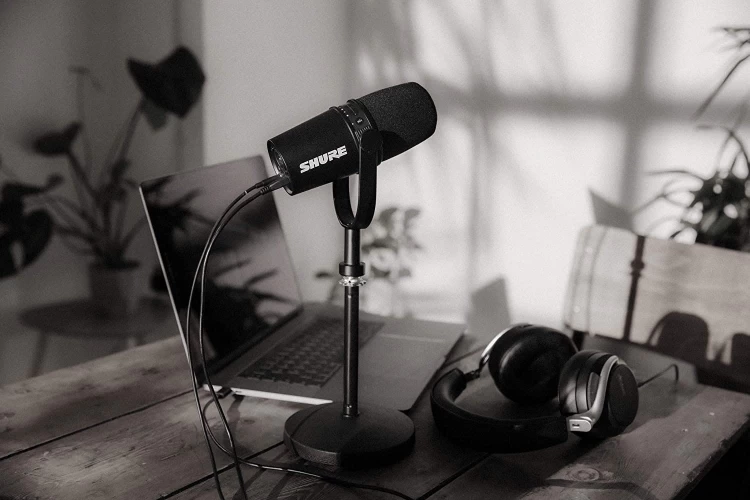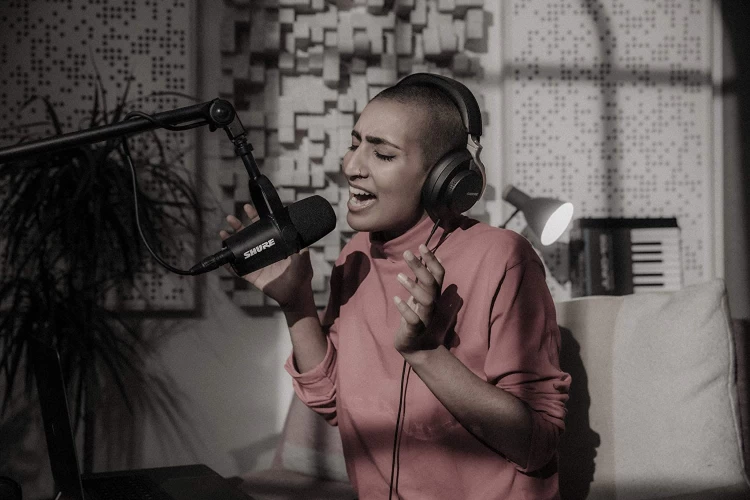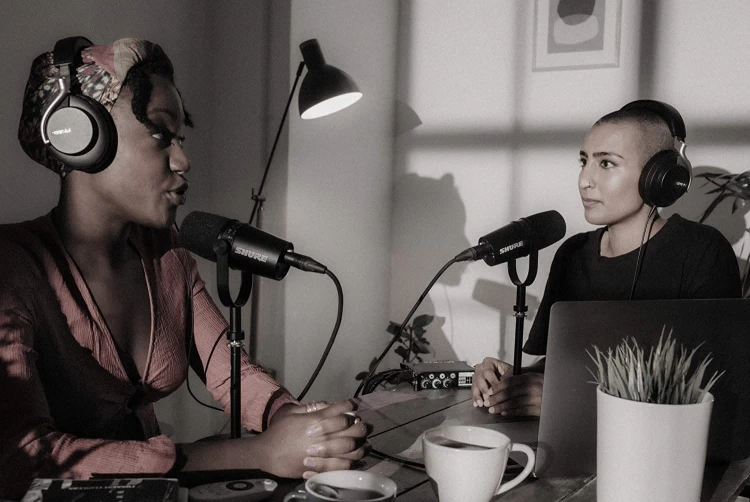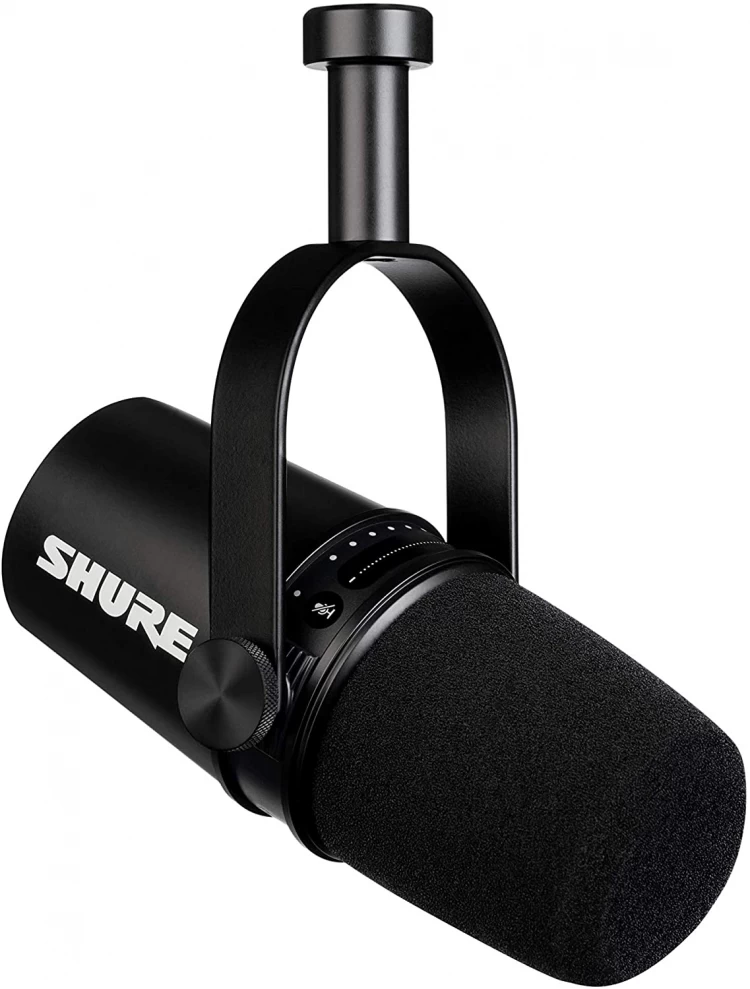Shure MV7 Review | Musician Nerd
Updated on Mar 16, 2022
Table of Contents
The Shure MV7 is easily one of the most interesting podcasting microphones on the market right now. It was inspired by one of the most legendary, famous microphones, the Shure SM7B. However, not everyone can afford to pay the price for such a microphone, and not to mention the extra equipment you would need to get with it, so Shure, being the wonderful people they are, developed a cheaper alternative following the new status quo of offering USB powering.

Shure MV7 With Desktop Stand And Headphones
There is a lot of competition in the market of speaking microphones, and while the SM7B often comes up in conversation, it's interesting to see where the Shure MV7 falls into place. In terms of pricing, it's more than some of the popular & affordable microphones, such as the Audio-Technica AT series, or the Blue Yeti series, but it's less than the well renowned XLR microphones such as the Electro-Voice RE20, or the Shure SM7B.
That being said, Shure specializes in the vocal market, whether it's for speech, hip hop, or singing. Their dynamic microphones are some of the highest quality the market has to offer. They understand how to offer the best vocal presence with great audio depth and clarity.
For this review, we'll be considering where the Shure MV7 falls in terms of price with its closest competitors and comparing the level of quality we get. Is it worth spending the extra $100 over the AT series microphones, and how does it compare to its legendary older sibling? These are great questions that we're excited to answer for you.
Why It's Great
The Shure MV7 comes from an amazing brand for vocal microphones, and this pick is no exception. We're going to start by talking about some of the more unique features before covering the standard important factors to look at when buying a microphone. As a podcasting microphone, you're going to want strong vocal presence and clarity, and thanks to one of the Shure MV7's greatest features, you can control all of that yourself.

Gamer Live Streaming With The Shure MV7
The Shure Motive Desktop App gives you an expanded set of features to use when recording your voice, whether it's live or during recording. The first feature that stands out to me is the auto-leveling mode. If you're inexperienced in podcasting, it's really easy to lack consistency in your voice, and the Motiv app will help you with that.
There's also an equalizer feature, allowing you to control the tone levels in your voice. However, for those who aren't as familiar with such features, they offer premade "voices" for you to choose from, which all sound really great out of the box. I knew about this app beforehand, but I was really surprised when I first booted it up and saw the range of features to choose from. You can even choose how close (or how far) you would like to be from your microphone!
As a cardioid pattern dynamic microphone, the Shure MV7 will isolate your voice from the surrounding noise in your background. Many of us don't have a dedicated sound proofed room like you would see in a radio booth, and forunately we won't have to worry about picking up unwanted noises with this mic.

Singer Using The Shure MV7 With A Boom Stand
As we've discussed before, you'll have the choice to choose from XLR to USB connection types. If you're using XLR, you'll most likely need to purchase a microphone preamp (which has many benefits) or a mixer before you can connect it to your recording device. XLR output often sounds a little bit better than USB, and in my minimal testing, I found this to be true with the Shure MV7, but hardly enough for you to worry about.
The advantage to using the USB connections is that you can work with many more devices (though you may need an adapter if you plan to use a phone or tablet), and have the simple advantage of plug-and-play. There's also a headphone jack for zero-latency monitoring of your audio. This is particularly helpful during live streams and podcasts, so big plus there!
In terms of the overall sound, the Shure MV7 sounds amazing, with great depth to your sound, and strong vocal clarity. We emphasize the clarity & presence as they play a fundamental role in any spoken application.
What It's Good For
The Shure MV7 is most popularly used as a podcasting microphone, thanks to the unique voice isolation technology. When you're able to get a strong vocal presence with strong audio depth, your words cut through to your audience, keeping all the attention on you.

Using Shure MV7 Microphones For A Podcast
However, it doesn't stop there. As we often find with such mics, the Shure MV7 works great as a YouTube microphone as well as a streaming microphone for the very same reasons. Microphones are very complex in how they handle audio, and Shure mics more often than not do a great job with the spoken word.
For that reason, you'll find the Shure MV7 works great for rap & hip-hop music, similar to the SM7B. Because rap falls in between singing and speaking, the Shure MV7 will give you strong vocal clarity, so every single syllable of your verse will be very pronounced and sharp. With the included Shure Motiv app, you can equalize the sound to further enhance the sound for your every need.
Lastly, I've also seen the Shure MV7 used for singing, but in my honest opinion, if that's your primary goal, there are better microphones in this price range for that. It's always good to have versatility, so for some people that may just be an added benefit to investing in this awesome sounding microphone.
The Downsides
Overall, there was only one little issue I had with the Shure MV7, and that's with the USB port. I hate it when my one con with a microphone comes down to a little design flaw such as this because the microphone itself sounds absolutely amazing. To be fair, I have several friends who own this microphone and only one of them agreed that this was an issue. I've also reached out to several users of this microphone to gather their thoughts, and almost none of them said this was an issue for them.
That being said, it may be hit or miss, or it may depend on how you position your microphone. Either way, there are usually good warranty and return programs for Shure microphones. I wouldn't skip out on a great microphone if everything else fits with your needs.
Pros & Cons
Pros
- Amazing Dynamic Vocal Microphone
- Shure Motiv App for EQ
Cons
- USB-port is not the most durable
Best Used For
- Podcasts, Videos & Streaming
- Singing / Hip Hop Vocals
Alternatives
When discussing some of the alternatives to the Shure MV7, we'll be focusing on two more affordable options that we love. This is because we can say definitively if you want a more expensive alternative, you're most definitely looking for the Shure SM7B. It's like the Shure MV7 but turbocharged to the max.
The first affordable alternative we'll look at is the Rode PodMic, which comes in around $100. It was designed for... you guessed it! Podcasts. If you're looking for something speech-related, for videos and streaming, the Rode PodMic is a great choice for you. However, if you want something more versatile (for things such as a guitar), skip ahead to the second alternative.

Rode PodMic Tilted On The Stand
This podcasting microphone has an amazing design aesthetic to it, using the classic broadcast shaped capsule. Despite being a dynamic microphone, it has a wide range frequency response of 20Hz to 20kHz, giving your voice massive amounts of depth. You'll find that this relatively affordable microphone gives you strong vocal presence and clarity.
It also comes with a u-shaped suspension mount, so you can connect it to any microphone stand while gaining the benefits of a shock mount. This will prevent any handling noises from ruining your recorded audio.
Overall I love using the Rode PodMic, and recommend it to anyone looking to do a podcast on a budget.
Check Price On Amazon (PodMic)
The next option we'll look at is the Audio-Technica AT2020, another highly popular microphone on the market that works great for podcast & singing, but so much more. The Audio Technica is a really versatile studio microphone that comes in two variants, XLR & USB.

Audio-Technica AT2020 On Desktop Stand
A friend of mine religiously uses the Audio-Technica AT2020 everytime we're on calls. It offers incredible vocal presence, with a high level of depth, and does a great job at canceling out background noise. As a cardioid condenser microphone, you're getting a wide range frequency response, allowing the audio to record more detail sound waves. However, using the cardioid pattern, allows this side addressed microphone to pick up only what's given directly to the primary capsule while blocking out the rest.
I personally enjoy this microphone for other activities as well, using it as my primary microphone for recording acoustic guitar. Using two of them, I'm able to pickup incredible depth from my guitar strings, and the high SPL (Sound Pressure Levels) prevent distortion of loud sources. Overall, an awesome microphone to checkout.
Check Price On Amazon (AT2020)
Read Our Review: Audio-Technica AT2020USB+ Cardiod Condenser
Summary
Overall, the Shure MV7 is a highly qualified cheaper alternative to the legendary Shure SM7B. Many are starting to use this as their primary podcasting microphone thanks to the incredible vocal sound it offers. If you're looking for a little more juice than some of the ~$100 microphones on the market, but either can't afford the higher-end options or want the USB option, then the Shure MV7 is very well worth looking into.
Better yet is the awesome Shure Motive Desktop App, offering you your own EQ functions. One of the best advantages of USB Microphones is all of the great software you can connect to your microphone via computer.
If you've decided that the Shure MV7 is the right microphone for you, let us know in the comments below how it's working out for you! We love hearing your valuable feedback, and including some of your own thoughts in our content. If you've recorded anything interesting, feel free to link it below.
Posted on Apr 08, 2021
Streaming Recording
Have questions for us? Email us at info@musiciannerd.com
